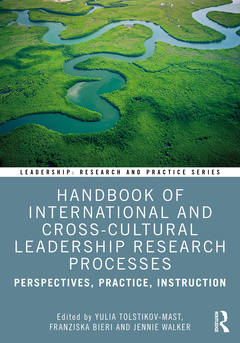Description
Handbook of International and Cross-Cultural Leadership Research Processes
Perspectives, Practice, Instruction
Leadership: Research and Practice Series
Coordinators: Tolstikov-Mast Yulia, Bieri Franziska, Walker Jennie L.
Language: English
Subjects for Handbook of International and Cross-Cultural Leadership...:
Keywords
Uncertainty Avoidance; Vice Versa; Common Language; Global Leadership Research; Leadership Development; Global Leadership Competencies; Institutional Review Board; Global Leadership Development; International Research Collaboration; Global Leadership Studies; Indigenous Research Methods; Researcher’s Country; LGBTQ Community; Leadership Research; Violates; Quantitative Research; Traditional Leadership Research; Global Mindset; Cross-cultural Leadership; Global Leadership; Part III; Survey Translation; Leadership Studies; Civil Society; Courageous Follower
Publication date: 11-2021
· 17.8x25.4 cm · Paperback
Publication date: 11-2021
· 17.8x25.4 cm · Hardback
Description
/li>Contents
/li>Biography
/li>
An invaluable contribution to the area of leadership studies, the Handbook of International and Cross-Cultural Leadership Research Processes: Perspectives, Practice, Instruction brings together renowned authors with diverse cultural, academic, and practitioner backgrounds to provide a comprehensive overview and analysis of all stages of the research process.
The handbook centers around authors? international research reflections and experiences, with chapters that reflect and analyze various research experiences in order to help readers learn about the integrity of each stage of the international leadership research process with examples and discussions. Part I introduces philosophical traditions of the leadership field and discusses how established leadership and followership theories and approaches sometimes fail to capture leadership realities of different cultures and societies. Part II focuses on methodological challenges and opportunities. Scholars share insights on their research practices in different stages of international and cross-cultural studies. Part III is forward-looking in preparing readers to respond to complex realities of the leadership field: teaching, learning, publishing, and applying international and cross-cultural leadership research standards with integrity. The unifying thread amongst all the chapters is a shared intent to build knowledge of diverse and evolving leadership practices and phenomena across cultures and societies.
The handbook is an excellent resource for a broad audience including scholars across disciplines and fields, such as psychology, management, history, cognitive science, economics, anthropology, sociology, and medicine, as well as educators, consultants, and graduate and doctoral students who are interested in understanding authentic leadership practices outside of the traditional Western paradigm.
Part I. Philosophical and Conceptual Traditions 1. Leadership Studies Across Cultures and Nations: Traditional Epistemology and New Horizons 2. International Followership: A Research Review Including Issues, Challenges, and Future Directions 3. Whose Leadership Questions Do We Ask? Whose Leadership Knowledge Do We Capture? Part II. International Leadership Research Processes: Core Issues in Study Design, Data Collection, and Analysis Section A. Planning and Designing Leadership Research in International Contexts 4. Early Stages of an International Research Collaboration: A Followership Study in Russia 5. Leaders around the World: New Avenues for the Comparative Study of Political Leadership 6. Planning to Address Ethical Challenges of International Leadership Research 7. Conducting International Leadership Research within the Government Sector: Context from an Interpretative Phenomenological Analysis (IPA) Study 8. Courage Required: LGBTQ Leadership Research in Multifaceted Realities 9. Research with Native American Communities-Experiences with the Lakota 10. Researching Religious Leadership in a Postmodern, North-West European Context 11. Women Leaders and Activists in Authoritarian, Patriarchal, and Religiously-Traditional Societies Section B. Quantitative, Qualitative, and Unique Design Considerations 12. The Relevance of Survey Translation and Data Quality in Leadership Studies: How to Include Diverse Voices in Survey Design 13. Multicultural Research Contexts 14. Indigenous Oral History Methods in Leadership Research 15. Survey Design and Implementation Considerations in International and Cross-National Research 16. Research in Unchartered Territories: Lessons from Suriname and Haiti 17. The Colonization of Cross-Cultural Leadership and Followership Research 18. Social Media and Crowdsourcing for International Leadership Research: Untapped Potential 19. Planning a Quantitative Study on Leadership in Japan 20. When Archived Research is the Dataset: Reflections on a Qualitative Content Analysis Study Section C. Data Interpretation and Conclusions. 21. Global Civil Society and Planetary Health: Overcoming the Myth of Objectivity 22. Canteyuke: Exploring the Lakota Virtue of Generosity in Relationships and Research 23. Exploring and Understanding Multifaceted International Leadership Realities Part III. Insights, Gaps and Future Directions Section A. Teaching and Learning International Leadership Research 24. Internationalization of Doctoral Research Education: Experiential Learning in Global Practicum and Research Internships: Part 1 25. Enhancing International Research Training: Student Perspectives, the Role of Faculty and Institutional Support: Part 2 26. Race, Whiteness, Intersectionality, and Teaching International Leadership Research 27. Doctoral Leadership Programs: Preparing Stewards of the Leadership Discipline 28. Discovering the Behaviors of Effective Leaders in Africa: A Doctoral Student’s Journey into International Leadership Research 29. International Research in Crisis Situations and Unprecedented Times of Uncertainty Section B. Publishing and Applications 30. International Publishing: Challenges and Considerations 31. The future Agenda for International Leadership Research and Practice 32. Benefits of Conducting International Leadership Research in an Ever-Changing Global Environment 33. Chronicles of an International Leadership Researcher: Personal and Professional Benefits of ILR Section C. Concluding Thoughts: Zooming in on the International Leadership Research Standards. 34. Success in International Leadership Research 35. Lessons Learned: Doing Cross-Cultural and International Research with Integrity
Yulia Tolstikov-Mast,Ph.D., is a global leadership scholar, doctoral faculty, and authentic research advocate. Yulia is Professor of Ethical and Creative Leadership at the Interdisciplinary Ph.D. Program at Union Institute and University. She researches global leadership and followership, international professional communication, leadership education, and social change.
Franziska Bieri, Ph.D., teaches undergraduate social science classes at the University of Maryland Global Campus and doctoral global leadership and research methods courses at the Indiana Institute of Technology's Ph.D. Program in Global Leadership. Her areas of research include international nongovernmental organizations, global governance, and comparative labour markets.
Jennie L. Walker, Ph.D., is Lead Faculty and Associate Professor for Business Leadership at Forbes School of Business & Technology, University of Arizona Global Campus. She specializes in global leadership research and developing people and organizations for success in complex, diverse, and increasingly global environments.




